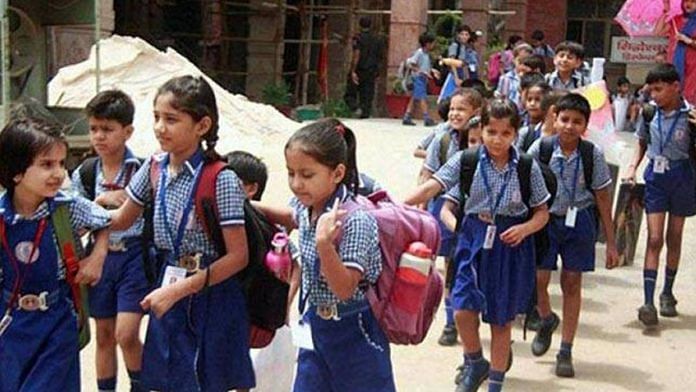New Delhi: Assessment process in schools should not be a “one-time exercise” but a continuous process, and schools should have a credit-based system, awarding CGPA (Cumulative Grade Point Average) instead of marks. These are some of the recommendations found in the new Standard operating procedure (SoP) to assess school boards in India.
The SoP to give equivalence to various school boards in India has been prepared by the Association of Indian Universities (AIU), an autonomous body, and was approved by the Ministry of Education earlier this month. It will now be applicable to all school boards, which will have to adhere to the laid-down guidelines.
Currently, more than 100 unrecognised school boards exist in India and many have wide disparities in their curriculum and way of functioning. Taking note of this, the education ministry last year assigned to the AIU the task of formulating an SoP for a more standardised assessment of boards, and to help institutes identify real boards from fake ones.
Also read: 12,598 students score 100 in Class 10 maths, highest of all subjects in CBSE board exams
What are the guidelines?
According to the new SoP, a school board shall be one that is either established by an “Act of Parliament or State Legislature”, an “executive order/notification of the central/ state/ UT government”, or “set up by bodies/ institutions of central/ state government that have been given the mandate to do so by the central/ state government”.
It adds that the board should be a “well-established body with delegated responsibility to look after its various activities/ functions and it is being run through its various in-house committees like academic/ curriculum committee, examination committee, affiliation/ accreditation committee and finance committee”.
“These committees must associate people of repute having academic, administrative and social distinction. The board shall also include government representatives so that there is no adhocism in its decision-making process,” it says.
“The board shall not indulge in any of the commercial or unethical practices in regard to the prescription of curriculum, textbooks, reading materials, evaluation processes, and other classroom practices,” it warns.
The board is expected to follow all norms of the new National Education Policy (NEP) and National Curriculum Framework, which will be a blueprint for school syllabi across the country.
Need for an SoP
In India, school boards are established by the authorised central or state government bodies. However, several private boards have allegedly been awarding certificates of 10th and 12th standard education without due authorisation.
In the absence of any mandated organisation to check these private boards, the authenticity of certificates awarded by the boards cannot be ascertained. This is where the new SoP is intended to help.
“There are many school education boards in India at present, some at national level and mostly at state level, which are conducting grade 10/ 12 exams. There are wide disparities between them with regard to curriculum design, curriculum transaction and curriculum evaluation. There is no mechanism or statutory provision for establishing equivalency among them,” reads the SoP document.
Schools, colleges and other educational institutions can refer to the new SoP while attempting to authenticate a board certificate they have received.
Last November, the education ministry had written to the AIU, asking it to start working on the SOP. “It has come to the notice of the government that difficulties are being faced by students in respect of equivalence of certificates issued by various school education boards in India for the purposes of admission in higher secondary institutions and employment in central and state government,” the letter said.
SOP recommendations
The expert committee that formulated the SOP has also given several recommendations. One of them is to change the assessment process in schools.
“The assessment of students should be 360-degree and should be conducted using new approaches like project-based, inquiry-based, presentation-based, observations, quizzes, portfolios, experiments, group work, computerised adapted systems, etc., reads the SoP document.
It adds that there is a need to bring uniformity in assessment. “The assessment shall not be just a one-time exercise but should be a continuous and ongoing process. Cumulative Grade Average Point (CGPA) instead of marks as envisaged in the NEP with credit-based system should be implemented in school education and recognition of prior learning and lateral entry should be provisioned,” it adds. Here, lateral entry refers to transfer at the same level between two boards.
The CGPA is used to denote the overall performance of a student in the academic session in the form of grades, instead of percentages. Some school boards including the Central Board of Secondary Education (CBSE) and the Council for the Indian School Certificate Examinations (CISCE) already follow the CGPA system. The SoP recommends that all boards should use the system instead of awarding marks to students.
Further, the present assessment system is focussed only on the 12th grade. It does not lay focus on the quality of education imparted in lower classes and assessment at each stage, the committee has said.
(Edited by Nida Fatima Siddiqui)
Also read: School dropout rate among girls gone down in 4 yrs says Modi govt, claims credit for schemes



